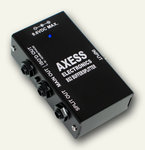nbarts
New member
I know all the guitar cable length talk is exaggerated, but is 40-50ft long cable still OK or I should go for a speaker cable?
I'm currently running 8ft to mxr-EQ 6ft to splitter & another 6ft to my amps (so total 20ft) with no problem. I want to start tracking in my control room, because headphones are killing me.
Since I run multiple amps a lot buying one long guitar cable would be a LOT cheaper than buying multiple speaker cables.
So who has experience tracking with long cables?
I'm currently running 8ft to mxr-EQ 6ft to splitter & another 6ft to my amps (so total 20ft) with no problem. I want to start tracking in my control room, because headphones are killing me.
Since I run multiple amps a lot buying one long guitar cable would be a LOT cheaper than buying multiple speaker cables.
So who has experience tracking with long cables?

